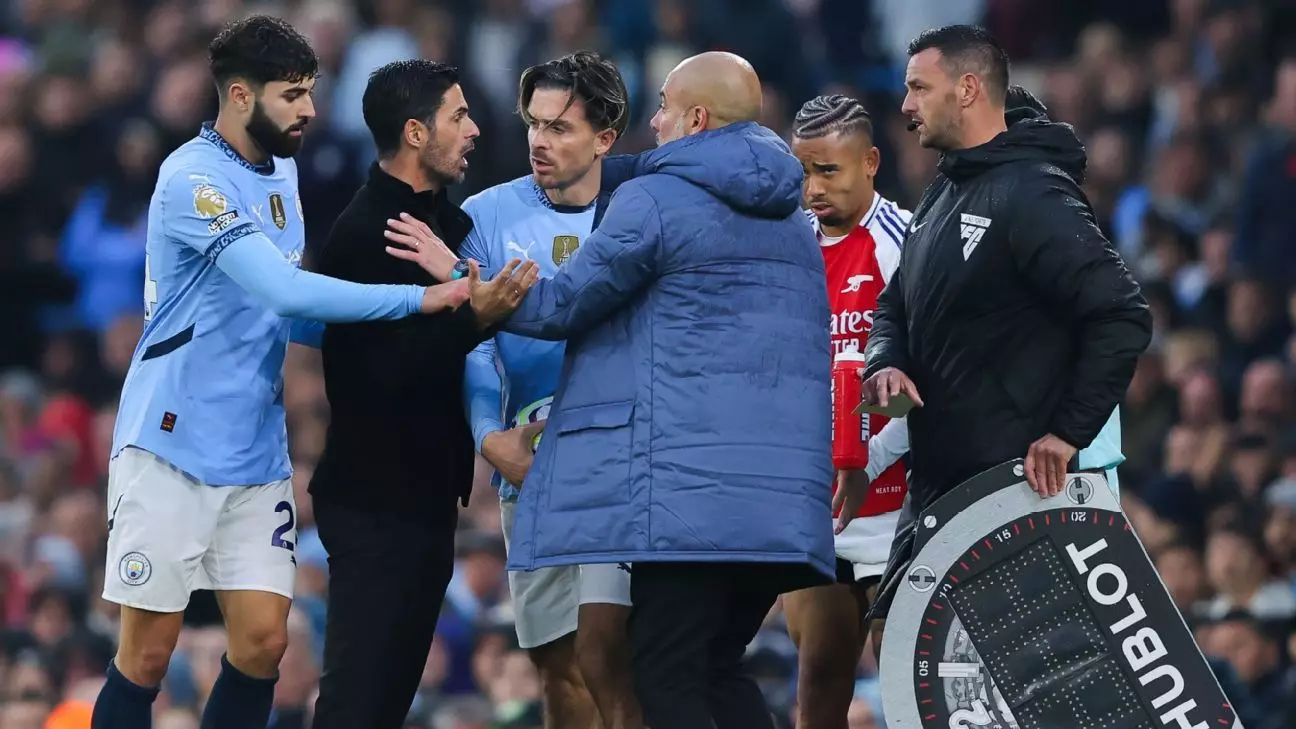The recent encounter between Arsenal and Manchester City in the Premier League stirred intense emotions, not just from the players on the pitch but also in the post-match commentary. The 2-2 draw at the Etihad Stadium catalyzed a debate about sporting conduct, particularly around the concept of “dark arts” in football. With several City players expressing their discontent regarding Arsenal’s tactics, the stage was set for an examination of competitive ethics in elite football.
The term “dark arts” is often used to describe unsavory tactics employed by teams to gain advantages—whether through time-wasting, feigning injury, or other gamesmanship. In the immediate aftermath of the match, City players John Stones, Manuel Akanji, and Bernardo Silva accused Arsenal of deploying these methods, particularly during periods when they were defending a slender lead with ten players. These assertions raised questions about the legitimacy of such tactics and their impact on the integrity of the game.
Arsenal’s approach, especially in the tense final moments, appeared strategic—they aimed to hold off a more dominant City side while managing an unfavorable situation. Mikel Arteta, the Gunners’ head coach, faced criticism but also offered a firm rebuttal. His remarks highlighted a critical point: assessments of conduct ought to be based on observable realities, not mere subjective interpretations.
Arteta’s comments pointed toward deeper issues than just tactical criticism. Following the match, it was revealed that several Arsenal players, including key contributors like Gabriel Martinelli and goalkeeper David Raya, were nursing injuries. Arteta’s frustration seemed rooted in how these injury concerns, which could significantly impact the team’s season, were being overshadowed by discussions around “dark arts.”
His assertion during the pre-match press conference for the Carabao Cup against Bolton Wanderers was clear: while players and coaches engage in post-match banter, the well-being of the squad takes precedence. By emphasizing that the injuries would limit player availability, Arteta sought to steer the conversation back to substantive issues rather than speculative interpretations of tactics.
A pivotal part of Arteta’s argument revolved around the learning curve involved in high-stakes football. He referenced a prior encounter where Arsenal suffered a humiliating defeat while playing with ten men against Manchester City in 2021. This backdrop provided context for Arsenal’s self-preservation tactics during the recent game, suggesting that experience from past losses has shaped their current strategy.
Arteta underscored the necessity of adapting to evolving match situations—an essential aspect of football at the highest level. His acknowledgment of Arsenal’s tactical modification in response to the game’s dynamics showed a keen understanding of the sport’s competitive nature, thus contesting the notion that employing certain strategies constitutes poor sportsmanship.
The encounter culminated in post-match exchanges that included Erling Haaland’s noted admonition to Arteta to “stay humble.” This remark encapsulates the spirit of competitive rivalry but also serves as a snapshot of the tensions that can arise in football culture. Arteta’s nonchalant response suggested that he embraces all facets of the sport, from triumphs to criticisms, reflecting a broader theme of resilience and respect within competition.
Ultimately, Arteta’s responses reveal a deeper narrative: the blend of strategy, sportsmanship, and emotional dynamics within modern football. As teams vie for titles and prestige, the battle extends beyond the field into the realm of public perception and commentary, where actions are often scrutinized under a magnifying glass.
This incident not only highlights Arsenal’s current standing in the league but also serves as a reminder of how narratives are crafted in sports. The discussions surrounding tactics, injuries, and criticisms are merely threads in the complex tapestry of a competitive season, sustaining the enduring intrigue of football. Thus, in the face of controversy, it becomes crucial for clubs like Arsenal to stay focused on their broader objectives while navigating the intricate web of public expectations and competitive pressure.

Leave a Reply